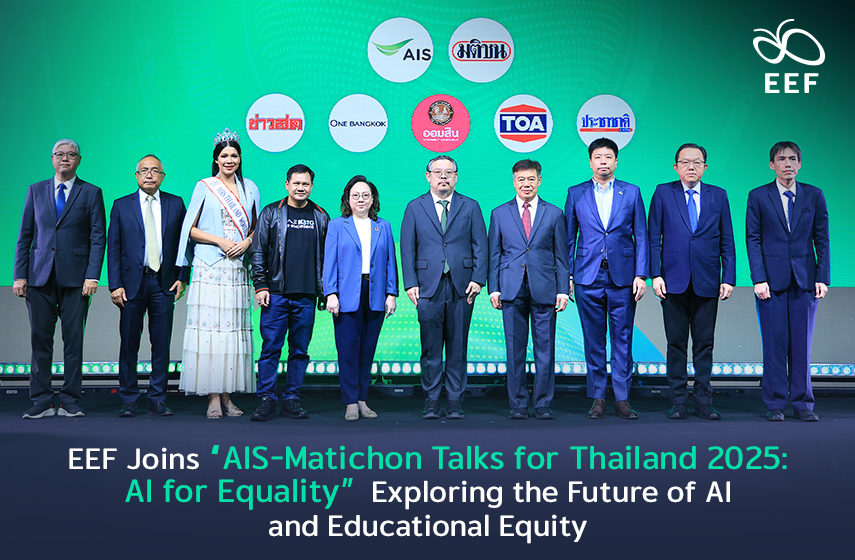
October 2025, Matichon Newspaper and Matichon Online, in collaboration with Advanced Info Service (AIS), hosted a thought-provoking social forum titled “AIS-Matichon Talks for Thailand 2025: AI for Equality”—a deep dive into how artificial intelligence (AI) is reshaping human life in every dimension. More than a leap in data accessibility and analysis—from basic use to advanced engagement—AI represents a force that can both bridge and broaden social divides, especially among vulnerable groups left behind by technology’s rapid rise.
Among the experts on the panel “AI Thailand” were Dr. Sak Segkhunthod, Advisor to the Electronic Transactions Development Agency (ETDA); Dr. Kraiyos Patrawart, Managing Director of the Equitable Education Fund (EEF) Thailand; Assoc. Prof. Dr. Cherdchai Nopmaneechamraslert, Vice President for Information and Digital Transformation, Mahidol University; and Asst. Prof. Dr. Rachasak Somyanonthanakul, Secretary of the Artificial Intelligence Association of Thailand. The session was moderated by Monchai Wongkittikraiwan.

The discussion opened with a central question: how will AI amplify—or alleviate—inequality in Thai society? Dr. Sak began by outlining Thailand’s digital landscape. Out of 50 million internet users, 78% of disadvantaged citizens now have online access—a significant increase from the previous year. Yet, most use it for entertainment or online shopping. Not access, but purpose is the challenge now: how can digital infrastructure be leveraged to improve quality of life, rather than merely to entertain?
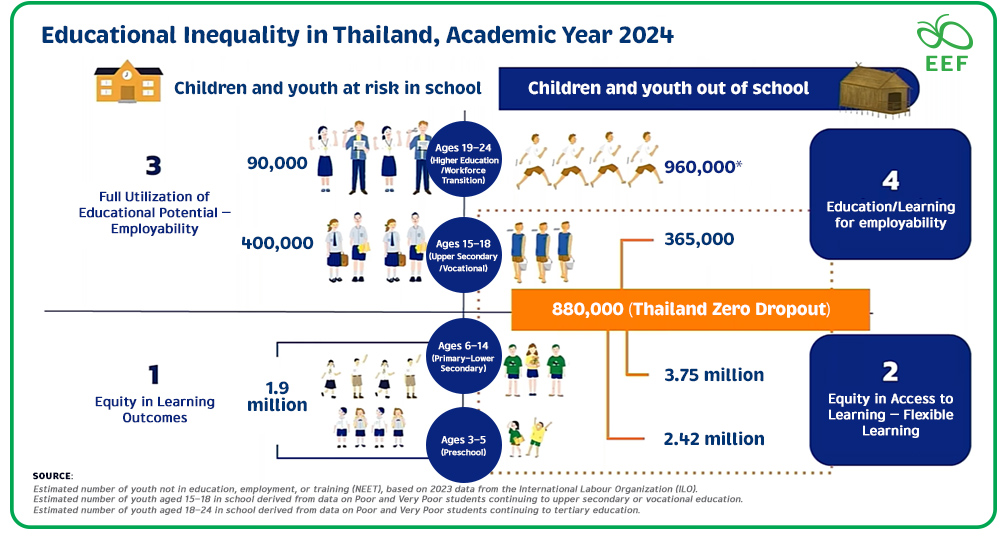
Building on that, Dr. Kraiyos drew a sobering connection between digital access and education. Today, 880,000 Thai children aged 3–18 remain out of school, completely disconnected from even basic learning. Of the country’s nearly nine million school-age children, around 10% have no access to education at all, making AI an almost unreachable concept. Unless educational inequity is addressed first, he argued, Thailand will struggle to seize the opportunities of the AI era.

“Education begins with opportunity. Once we unlock access to learning, we can move toward technology-enabled education, preparing Thai youth, ten or twenty years from now, to collaborate with AI as it evolves into AGI,” emphasized Dr. Kraiyos. Only nine years of average schooling, he warned, may cause Thailand to miss a defining moment in human progress as AI advances toward artificial general intelligence.
Assoc. Prof. Dr. Cherdchai added that AI will inevitably transform every level of education, from primary to tertiary. Students can now generate answers or complete assignments with AI without truly understanding them. This, he argued, demands a complete rethinking of teaching and assessment. Not rote learning, but critical thinking and project-based exploration must define the classroom, where students use AI as a partner in inquiry, creativity, and collaboration—not a shortcut.
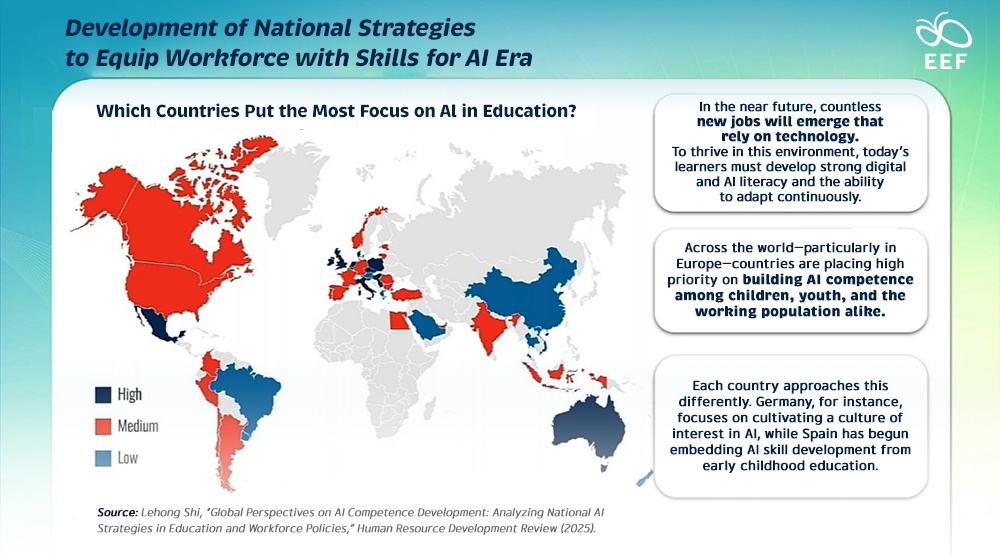
Echoing this, Dr. Kraiyos observed that countries worldwide are embedding AI into school curricula at varying paces. Some move quickly, others proceed cautiously. Yet no global standard exists, and the technology’s rapid evolution makes it difficult to define what “appropriate integration” really means.
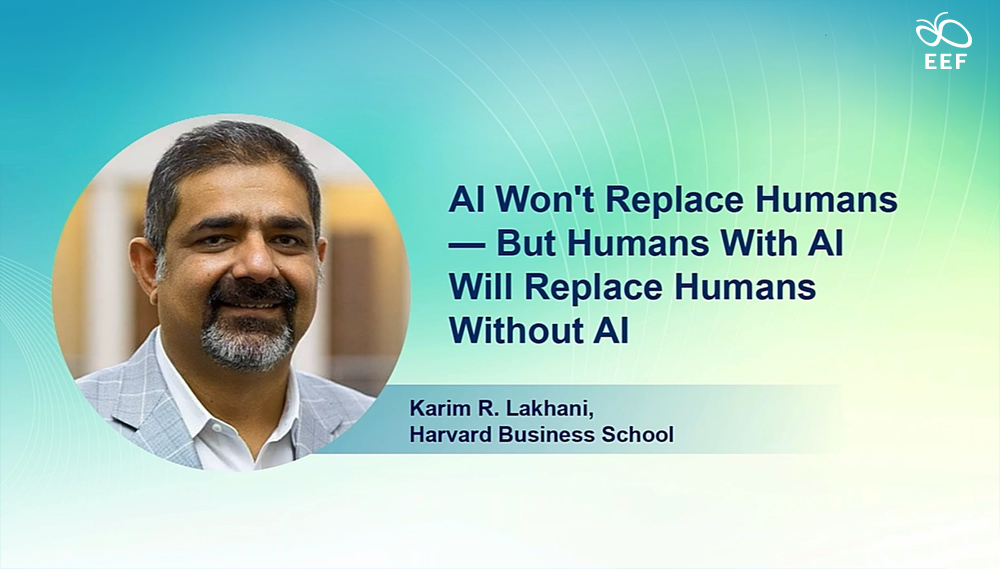
He cited Harvard Business School’s Prof. Karim R. Lakhani, who famously said: “AI won’t replace humans; but humans with AI will replace humans without AI.” That, Dr. Kraiyos explained, captures the heart of educational inequality in the AI era. As countries prepare to implement AI in education policy—likely accelerating between 2026 and 2027—Thailand must ensure that its learners graduate equipped to use AI effectively and responsibly.
AI’s promise, Assoc. Prof. Dr. Cherdchai continued, lies in personalized learning. By analyzing how each student asks questions, AI can identify knowledge gaps and adapt lessons to match individual learning speeds and styles. This data-driven feedback not only supports students but also guides teachers, revealing where each child struggles and how instruction might improve. Thus does AI become both mirror and mentor, helping narrow the learning gap for every child.
Asst. Prof. Dr. Rachasak added that while AI should be accessible to all, its use must remain ethical and purposeful. Universities, he urged, must ensure AI enhances—not diminishes—students’ capacity for analytical thought and problem-solving. In the near future, employability itself may depend on one’s ability to use AI effectively—a reality that demands clear frameworks and oversight.
When asked how AI could help reduce educational inequity across economic, skill-based, and ethical dimensions, Dr. Kraiyos responded: “We can pilot AI tools with disadvantaged children—those who have never touched AI—and turn the results into policy recommendations. This shows that AI is not merely a driver of economic growth, but a catalyst for human development, closing the resource gaps within our educational system.”
He recalled a conversation with the OECD envisioning a classroom of the future—where teachers, students, and AI avatars learn together. Teachers use AI, and so do students. In some lessons, students learn from teachers; in others, teachers learn from students. Teachers train AI to teach, and AI, in turn, helps teachers teach, while together they teach students how to train AI, each learning from the other in a continuous cycle of improvement.
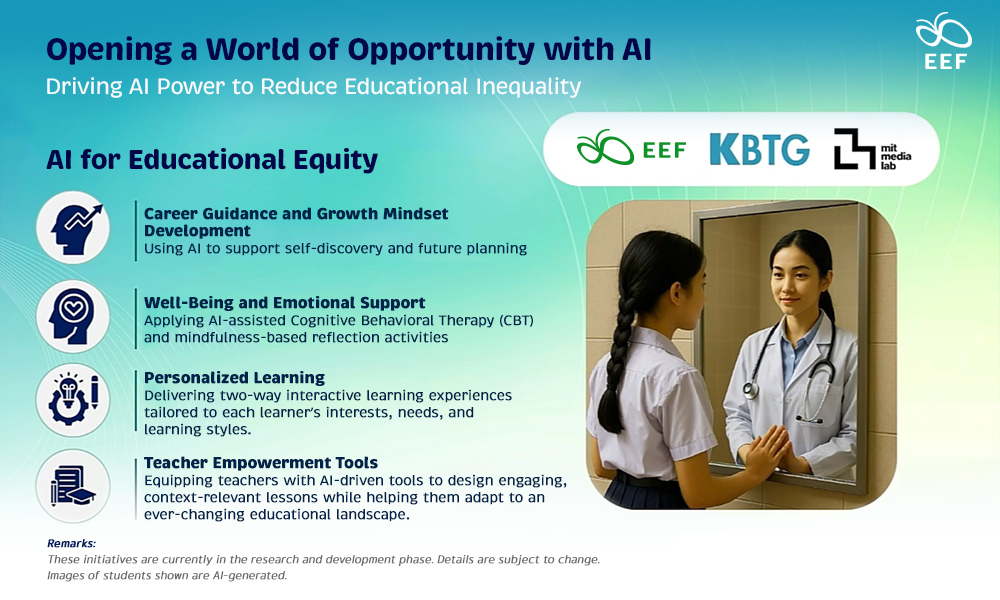
Concluding the session, Dr. Kraiyos underscored the importance of policy stability and long-term vision. “If AI is to become a national priority, the government must commit to consistent policy, curriculum, and legal frameworks,” he said. “Frequent shifts in direction will only deepen inequality. Stability—across developers, educators, and communities—will be the key to sustainable progress in the next few years.”

While collaboration between the public and private sectors, he added, is vital for AI exploitation, continuity of support is what turns ambition into impact. “EEF can plan one-year projects—or three- and five-year strategic plans—and see them through. With such continuity, success becomes predictable, and confidence grows. Stability, I believe, is the truest foundation for Thailand to compete—not just with others, but with our own potential.”

